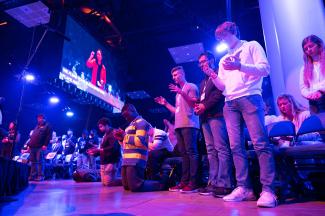“What Does God Want Me to Do?”: Urbana 22 and the Heart of God

One of the most decisive questions any person can ask is “What does God want me to do?” But not necessarily for the reason you might think.
When we ask this, we almost immediately (and naturally) put the emphasis on “do.” This frames the question and its expected answer in terms of action, direction, motion — something concrete and visible. This isn’t wrong or bad; in fact, it’s quite valuable. We are embodied creatures, stewards of God’s creation and his redemptive work in the physical world. To fully be Jesus’ disciples, we must “do” God’s will in actual, real-life steps of obedience (Jas 2:17). Moreover, questions of doing are almost always the most vexing ones for us, the ones that snare us in the deepest tangles and knots of our lives.
At the same time, this subtle emphasis in the question obscures another key word, one that’s just as crucial for the shape of our lives as disciples: “want.”
God Wants
For four days at Urbana 22, thousands of students worshiped, studied Scripture, prayed, and discerned their place in God’s whole-world, whole-life mission. They asked this question in countless ways and discerned countless answers, each of them uniquely responding to the conference’s invitation to “Rise Up” to God’s call on their lives. With holy intensity, they asked, “God, what do you want me to do?” — and also, “God, what do you want me to do?”
Phrased the second way, this question illuminates a great truth that covered all of Urbana and that, from the very beginning, has saturated all creation.
In a way that is so holy and sacred and perfect that it’s almost incomprehensible, God wants.
God’s love is the surging, pounding wash of reality. All the doing, obeying, following in our lives as disciples takes place in this atmosphere of his desire; when he invites us deeper into his mission, revealing new steps of obedience and new parts of our hearts to transform, it’s for no greater reason than he wants to. Nothing is forcing his hand. God isn’t required to invite us closer to his heart and his purposes by some celestial bargain that he’d secretly love to escape from. Not in the slightest. He wants to.
That may seem like a self-evident observation, one so simple that it should almost go without saying. But it truly is significant, especially for every student who attended Urbana 22.
Rise Up!
The invitation to “Rise Up” and join God’s global mission is more than a challenge to muster up our willpower so that we can start grinding out a life of moral excellence and ascetic self-perfection. It’s an invitation into a life where God’s “wanting” of us is the most powerful, most compelling reality we experience — the fuel and frame for all our “doing.”
And God’s “wanting” is even more specific than just an expression of love and a desire for closeness. It goes further. On the inside of this God-wanted life he longs to share with us, we discover (to borrow a phrase from this Urbana 22 video) that God is faithful and true. Strong and good. With him, we become the people he designed us to be, that he longs for us to be. Faithful and true. Strong and good.
 That’s why, in the last words of his last Urbana talk, Bishop Claude Alexander could cry out, “I’ve got good news: Jesus saves! And I wonder, is there anyone hear who knows that’s a good message to be able to shout? I’ve got good news! I’ve got good news! I’ve got good news!”
That’s why, in the last words of his last Urbana talk, Bishop Claude Alexander could cry out, “I’ve got good news: Jesus saves! And I wonder, is there anyone hear who knows that’s a good message to be able to shout? I’ve got good news! I’ve got good news! I’ve got good news!”
You’ve got good news because God hasn’t just saved you; he’s saved you into his heart. He hasn’t just sent you; he’s sent you with his heart. You’re not just rising up; you’re rising up to his heart — a heart that wants you more, believes in you more, and is excited about you more than you could ever be yourself.
More than any other life we could choose or ask for, that life is worth having and telling others about. That truth is worth making the legacy of your time at Urbana 22 and the pillar of your soul for each day after.
Whatever God wants you to do from now on, he always, always wants you first.






